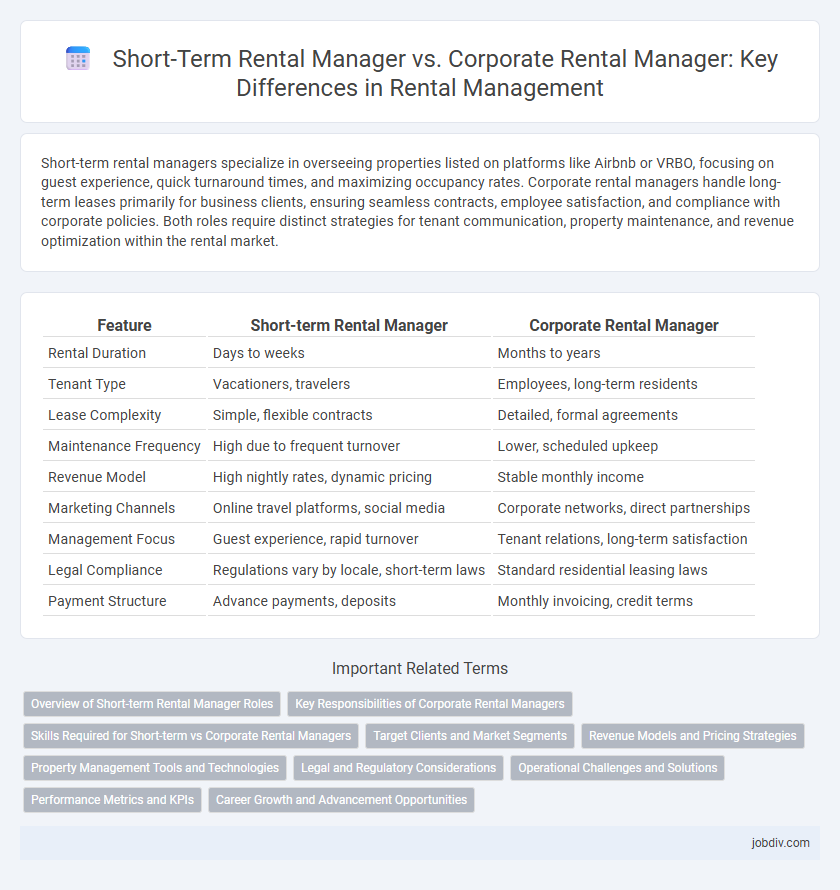Short-term rental managers specialize in overseeing properties listed on platforms like Airbnb or VRBO, focusing on guest experience, quick turnaround times, and maximizing occupancy rates. Corporate rental managers handle long-term leases primarily for business clients, ensuring seamless contracts, employee satisfaction, and compliance with corporate policies. Both roles require distinct strategies for tenant communication, property maintenance, and revenue optimization within the rental market.
Table of Comparison
| Feature | Short-term Rental Manager | Corporate Rental Manager |
|---|---|---|
| Rental Duration | Days to weeks | Months to years |
| Tenant Type | Vacationers, travelers | Employees, long-term residents |
| Lease Complexity | Simple, flexible contracts | Detailed, formal agreements |
| Maintenance Frequency | High due to frequent turnover | Lower, scheduled upkeep |
| Revenue Model | High nightly rates, dynamic pricing | Stable monthly income |
| Marketing Channels | Online travel platforms, social media | Corporate networks, direct partnerships |
| Management Focus | Guest experience, rapid turnover | Tenant relations, long-term satisfaction |
| Legal Compliance | Regulations vary by locale, short-term laws | Standard residential leasing laws |
| Payment Structure | Advance payments, deposits | Monthly invoicing, credit terms |
Overview of Short-term Rental Manager Roles
Short-term Rental Managers specialize in overseeing properties rented for brief durations, handling guest communications, bookings, and turnover coordination efficiently. They optimize occupancy rates through dynamic pricing strategies and ensure compliance with local regulations specific to short-term stays. Their role demands agility in managing frequent guest interactions while maintaining property standards to maximize revenue and guest satisfaction.
Key Responsibilities of Corporate Rental Managers
Corporate Rental Managers oversee large-scale property portfolios, ensuring high occupancy rates and maximizing rental income through strategic leasing and marketing. They coordinate with maintenance, legal, and finance teams to ensure smooth operations, compliance with corporate policies, and budget management. Their responsibilities also include negotiating contracts with corporate clients and implementing policies to enhance the overall tenant experience in commercial and residential corporate rentals.
Skills Required for Short-term vs Corporate Rental Managers
Short-term rental managers require expertise in guest relations, dynamic pricing strategies, and local marketing to maximize occupancy and guest satisfaction. Corporate rental managers need strong skills in contract negotiation, compliance with corporate policies, and long-term lease management to ensure stable revenue streams and tenant retention. Both roles demand proficiency in property maintenance coordination and financial reporting, but the focus shifts from short-term customer experience to sustained corporate partnerships.
Target Clients and Market Segments
Short-term rental managers primarily target individual travelers and vacationers seeking flexible, temporary accommodations, focusing on platforms like Airbnb and VRBO to reach leisure markets. Corporate rental managers cater to business professionals and companies requiring longer-term, reliable housing solutions, often negotiating directly with firms or through corporate travel agencies. Market segments differ as short-term managers emphasize hospitality and guest experience, while corporate managers prioritize compliance, consistency, and streamlined billing processes.
Revenue Models and Pricing Strategies
Short-term Rental Managers typically adopt dynamic pricing models that leverage real-time market demand and seasonal trends to maximize nightly rates and occupancy, often integrating platform fees and cleaning charges into their revenue streams. Corporate Rental Managers focus on fixed or tiered pricing strategies tailored to long-term contracts, emphasizing stable cash flow through negotiated leases, service packages, and corporate discounts. Revenue models for short-term rentals heavily depend on high turnover and ancillary services, while corporate rentals prioritize consistent occupancy and extended agreements to optimize profitability.
Property Management Tools and Technologies
Short-term rental managers leverage advanced property management tools designed for high turnover efficiency, including dynamic pricing algorithms, automated guest communication platforms, and integrated cleaning schedules. Corporate rental managers often utilize comprehensive software that supports long-term lease tracking, tenant relationship management, and detailed financial reporting to optimize portfolio performance. Both roles benefit from technologies that enhance occupancy rates, streamline operations, and improve tenant satisfaction through real-time data analytics and mobile accessibility.
Legal and Regulatory Considerations
Short-term rental managers must navigate complex local zoning laws, licensing requirements, and transient occupancy taxes that vary significantly by city and state. Corporate rental managers primarily focus on long-term lease compliance, tenant rights regulations, and fair housing laws that govern extended stays and commercial property use. Understanding the distinct regulatory frameworks ensures tailored risk management and legal adherence for both short-term and corporate rental operations.
Operational Challenges and Solutions
Short-term rental managers face operational challenges such as frequent guest turnovers, intensified cleaning schedules, and fluctuating occupancy rates, necessitating agile scheduling and dynamic pricing strategies to maintain profitability. Corporate rental managers contend with challenges including long-term lease management, consistent property maintenance, and tenant satisfaction, requiring streamlined communication systems and robust contract management solutions. Both roles benefit from integrating advanced property management software to optimize operations, reduce manual errors, and enhance customer experience.
Performance Metrics and KPIs
Short-term Rental Managers prioritize occupancy rate, average daily rate (ADR), and guest satisfaction scores to maximize revenue and maintain high turnover efficiency. Corporate Rental Managers focus on lease renewal rates, tenant retention, and net operating income (NOI) to ensure stable long-term profitability and reduce vacancy costs. Both roles leverage metrics like revenue per available unit (RevPAU) but emphasize different KPIs aligned with their rental duration strategies.
Career Growth and Advancement Opportunities
Short-term Rental Managers often gain rapid experience in diverse property types and guest interactions, enhancing skills in marketing and customer service, which can lead to swift career growth in dynamic markets. Corporate Rental Managers typically engage in structured environments with larger portfolios, focusing on operational efficiency, compliance, and strategic planning, offering advancement into senior management or regional director roles. Career pathways in short-term rentals favor adaptability and entrepreneurship, while corporate rental careers emphasize leadership development and organizational growth.
Short-term Rental Manager vs Corporate Rental Manager Infographic

 jobdiv.com
jobdiv.com